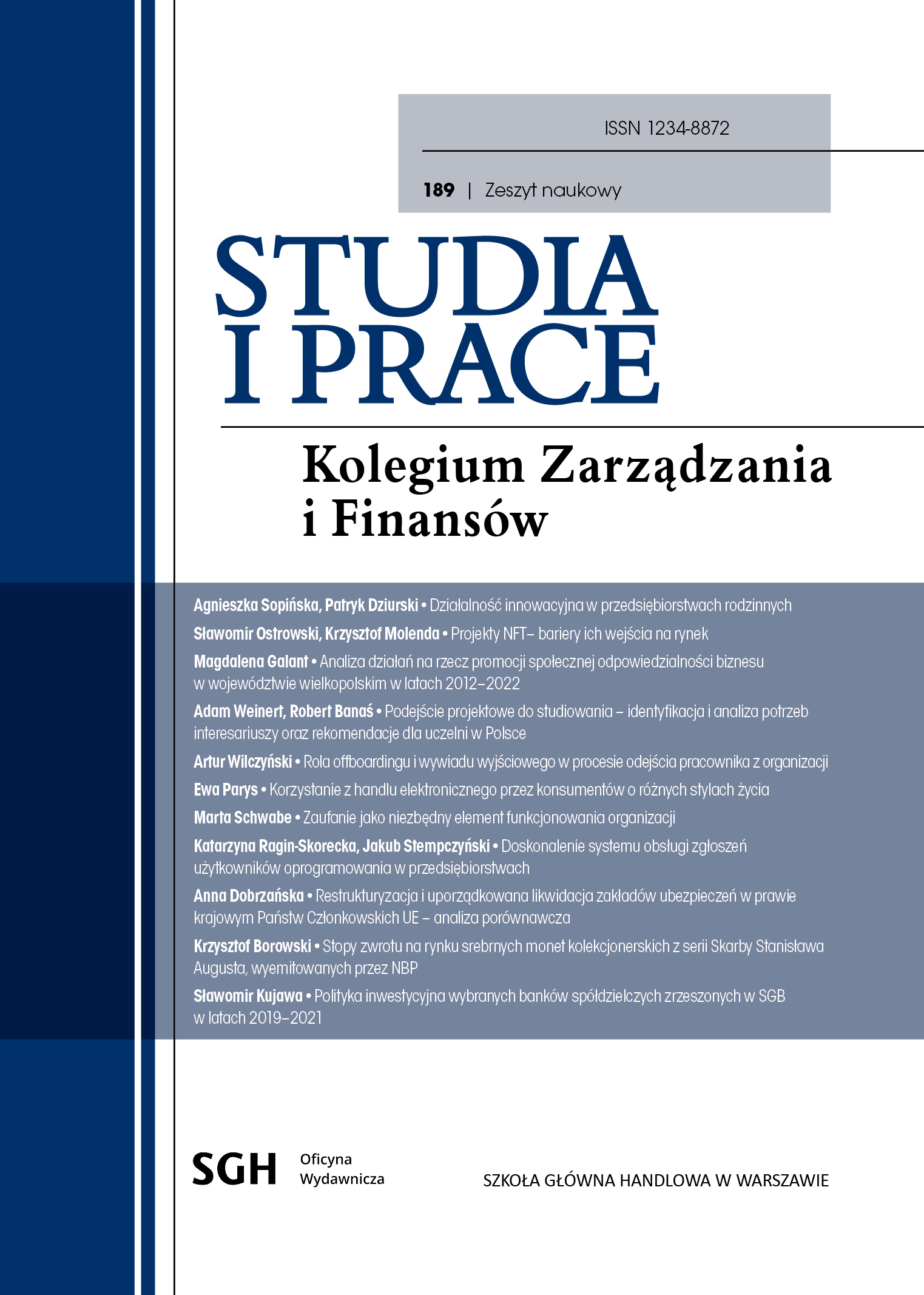Project approach to studying – identification and analysis of stakeholder needs and recommendations for universities in Poland
DOI:
https://doi.org/10.33119/SIP.2023.189.4Keywords:
design approach,, design thinking, project management, education, project methodAbstract
The article is a continuation of considerations on the issue of the project approach in the field of education at universities in Poland. An attempt was made on it identify and analyze the needs of stake[1]holders, including students, academic teachers and members of university student organizations. For this purpose, the following have been separated: the most important problems, barriers and difficulties affecting students and their advancement in design thinking; the quality level of education at Polish universities; the level of students’ project orientation; the level of entrepreneurship among students, graduates of high and vocational schools; educational offer of Polish universities in the field of project approach; the impact of the COVID-19 pandemic on higher education. The conducted research made it possible to determine the needs of stakeholders in terms of considerations on the author’s concept introduced in an earlier article [Radoła et al., 2021]. On the basis of the conclusions of the interviews indicated implication to for further quantitative research and development of assumptions for innovation responding to the identified gaps.
Downloads
References
2. GUS [2022], Raport „Szkolnictwo wyższe i jego finanse w 2021 roku”, https://stat.gov.pl/obsza ry-tematyczne/edukacja/edukacja/szkolnictwo-wyzsze-i-jego-finanse-w-2021-roku,2,18.html, dostęp: 21.01.2023.
3. Hrpolska.pl [2019], Raport: Student w pracy 2019, https://hrpolska.pl/rynek-pracy/badania/raport-student-w-pracy-2019, dostęp: 20.01.2023.
4. Nicholas J.M., Steyn H. [2012], Zarządzanie projektami, Oficyna Wolters Kluwer business, Warszawa.
5. Pan G.S. [2005], Information Systems Project Abandonment: A Stakeholder Analysis, „International Journal of Information Management”, 25(2).
6. PMI [2009], A Guide to the Project Management Body of Knowledge (PMBOK® Guide), Management Training & Development Center, Warszawa.
7. Popojutrze, https://popojutrze2.pl/, dostęp: 17.01.2023.
8. Rzempała J., Wiśniewski T. [2019], Poziom kompetencji studentów w zakresie zarządzania projektami na uniwersytetach i uczelniach technicznych: przypadek Programu IPMA-Student, „Przegląd Organizacji”, 3.
9. Spałek S., Zdonek I., Sołtysik-Piorunkiewicz A. [2015], Znaczenie i rola interesariuszy w zarządzaniu projektami, „Prace Naukowe Akademii im. Jana Długosza w Częstochowie”.
10. Urraca-Makuch L. [2019], Kompetencje przyszłości, https://issuu.com/magiel/docs/184-sgh, dostęp: 17.01.2023.
11. Włoch R., Śledziewska K. [2019]. Kompetencje przyszłości. Jak je kształtować w elastycznym ekosystemie edukacyjnym, DELab UW, Warszawa.
12. World Economic Forum [2020], The Future of Jobs Report 2020, Geneva.
13. Radoła M., Weinert A., Wójtowicz Ł., Banaś R. [2021], Podejście projektowe do studiowania w Polsce – stan obecny i identyfikacja trendów, w: Międzynarodowa innowacyjność i konkurencyjność w XXI w. Aspekty innowacyjne, red. Ł. Wójtowicz, P. Woźniak, Instytut Naukowo--Wydawniczy „Spatium”, Radom.
14. Związek Banków Polskich [2021], Portfel Studenta 2021: studenci finansowo odetchnęli, ale coraz gorzej z wiedzą finansową, https://zbp.pl/Aktualnosci/Wydarzenia/ Portfel-Stu denta-2021, dostęp: 18.01.2023.









